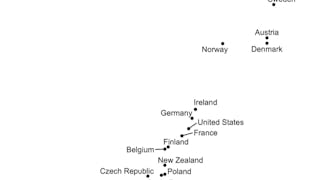We have all heard the phrase “correlation does not equal causation.” What, then, does equal causation? This course aims to answer that question and more!

Early bird sale! Unlock 10,000+ courses from Google, IBM, and more for 50% off. Save today.


A Crash Course in Causality: Inferring Causal Effects from Observational Data

Instructor: Jason A. Roy, Ph.D.
44,664 already enrolled
Included with 
(564 reviews)
Skills you'll gain
Details to know

Add to your LinkedIn profile
16 assignments
See how employees at top companies are mastering in-demand skills

There are 5 modules in this course
This module focuses on defining causal effects using potential outcomes. A key distinction is made between setting/manipulating values and conditioning on variables. Key causal identifying assumptions are also introduced.
What's included
8 videos3 assignments
This module introduces directed acyclic graphs. By understanding various rules about these graphs, learners can identify whether a set of variables is sufficient to control for confounding.
What's included
8 videos2 assignments
An overview of matching methods for estimating causal effects is presented, including matching directly on confounders and matching on the propensity score. The ideas are illustrated with data analysis examples in R.
What's included
12 videos5 assignments
Inverse probability of treatment weighting, as a method to estimate causal effects, is introduced. The ideas are illustrated with an IPTW data analysis in R.
What's included
9 videos3 assignments
This module focuses on causal effect estimation using instrumental variables in both randomized trials with non-compliance and in observational studies. The ideas are illustrated with an instrumental variables analysis in R.
What's included
9 videos3 assignments
Earn a career certificate
Add this credential to your LinkedIn profile, resume, or CV. Share it on social media and in your performance review.
Instructor

Offered by
Explore more from Probability and Statistics


Columbia University


Coursera Project Network


Columbia University
 Status: Free Trial
Status: Free Trial
University of Minnesota
Why people choose Coursera for their career




Learner reviews
564 reviews
- 5 stars
77.12%
- 4 stars
19.14%
- 3 stars
1.95%
- 2 stars
0.70%
- 1 star
1.06%
Showing 3 of 564
Reviewed on Apr 4, 2021
My work involves working with observational data. This course taught me to think in more formal and organized way on topics and questions of causal inference.
Reviewed on Mar 11, 2021
Excellent video lectures. Challenging end of module quizzes. I found more challenging doing the practical exercises because I had no experience with R.
Reviewed on Sep 6, 2020
I completed all 4 available courses in causal inference on Coursera. This one has the best teaching quality. The material is very clear and self-contained!

Open new doors with Coursera Plus
Unlimited access to 10,000+ world-class courses, hands-on projects, and job-ready certificate programs - all included in your subscription
Advance your career with an online degree
Earn a degree from world-class universities - 100% online
Join over 3,400 global companies that choose Coursera for Business
Upskill your employees to excel in the digital economy
Frequently asked questions
Access to lectures and assignments depends on your type of enrollment. If you take a course in audit mode, you will be able to see most course materials for free. To access graded assignments and to earn a Certificate, you will need to purchase the Certificate experience, during or after your audit. If you don't see the audit option:
The course may not offer an audit option. You can try a Free Trial instead, or apply for Financial Aid.
The course may offer 'Full Course, No Certificate' instead. This option lets you see all course materials, submit required assessments, and get a final grade. This also means that you will not be able to purchase a Certificate experience.
When you purchase a Certificate you get access to all course materials, including graded assignments. Upon completing the course, your electronic Certificate will be added to your Accomplishments page - from there, you can print your Certificate or add it to your LinkedIn profile. If you only want to read and view the course content, you can audit the course for free.
You will be eligible for a full refund until two weeks after your payment date, or (for courses that have just launched) until two weeks after the first session of the course begins, whichever is later. You cannot receive a refund once you’ve earned a Course Certificate, even if you complete the course within the two-week refund period. See our full refund policy.
More questions
Financial aid available,

